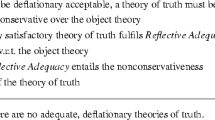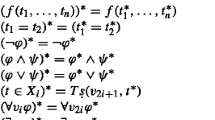Abstract
We study the relationships between two clusters of axiomatizations of Kripke’s fixed-point models for languages containing a self-applicable truth predicate. The first cluster is represented by what we will call ‘\(\fancyscript{PKF}\)-like’ theories, originating in recent work by Halbach and Horsten, whose axioms and rules (in Basic De Morgan Logic) are all valid in fixed-point models; the second by ‘\(\fancyscript{KF}\)-like’ theories first introduced by Solomon Feferman, that lose this property but reflect the classicality of the metatheory in which Kripke’s construction is carried out. We show that to any natural system in one cluster—corresponding to natural variations on induction schemata—there is a corresponding system in the other proving the same sentences true, addressing a problem left open by Halbach and Horsten and accomplishing a suitably modified version of the project sketched by Reinhardt aiming at an instrumental reading of classical theories of self-applicable truth.
Similar content being viewed by others
References
Belnap, N., A useful four-valued logic, in J. M. Dunn and G. Epstein, (eds.), Modern Uses of Multiple-Valued Logic, D. Reidel, Dordrecht, 1977.
Blamey, S., Partial logic, in D. M. Gabbay and F. Guenther (eds.), Handbook of Philosophical Logic, 2 ed., vol. 5, Kluwer, Dordrecht, 2002, pp. 261–353.
Cantini, A., Notes on formal theories of truth, Zeitschrift für Logik un Grundlagen der Mathematik 35:97–130, 1989.
Feferman, S., Systems of predicative analysis, Journal of Symbolic Logic 29:1–30, 1964.
Feferman, S., Towards useful type-free theories. I, Journal of Symbolic Logic 49(1):75–111, 1984.
Feferman, S., Reflecting on incompleteness, Journal of Symbolic Logic 56:1–49, 1991.
Field, H., Saving Truth from Paradox, Oxford University Press, Oxford, 2008.
Fischer, M., V. Halbach, J. Kriener, and J. Stern, Axiomatizing semantic theories of truth? The Review of Symbolic Logic 8(2):257–278, 2015.
Halbach, V., Axiomatic Theories of Truth. Revised Edition, Cambridge University Press, Cambridge, 2014.
Halbach, V., and L. Horsten, Axiomatizing Kripke’s theory of truth in partial logic, Journal of Symbolic Logic 71:677–712, 2006.
Hilbert, D., Über das Unendliche, in J. Van Heijenoort (ed.), From Frege to Gödel. A Source Book in Mathematical Logic, Harvard University Press, Cambridge, 1967.
Horsten, L., The Tarskian Turn, MIT University Press, Oxford, 2012.
Kremer, M., Kripke and the logic of truth, Journal of Philosophical Logic 17:225–278, 1988.
Kripke, S., Outline of a theory of truth, Journal of Philosophy 72:690–712, 1975.
McGee, V., Truth, Vagueness, and Paradox, MIT University Press, Cambridge, 1991.
Nicolai, C., M. Fischer, and L. Horsten, Iterated reflection over full disquotational truth (Submitted). https://arxiv.org/pdf/1703.02301.pdf.
Nicolai, C., and V. Halbach. On the costs of nonclassical logic, Journal of Philosophical Logic. doi:10.1007/s10992-017-9424-3.
Pohlers, W., Proof Theory. A First Step into Impredicativity, Springer, Berlin, 2009.
Reinhardt, W., Some remarks on extending and interpreting theories with a partial predicate for truth, Journal of Philosophical Logic 15:219–251, 1986.
Schmerl, U. R., Iterated reflection principle and the \(\omega \)-rule, Journal of Symbolic Logic 4:721–733, 1982.
Schwichtenberg, H., Proof theory: some applications of cut-elimination, in J. Barwise (ed.), Handbook of Mathematical Logic, North-Holland, Amsterdam, 1977.
Tarski, A., Der Wahrhetisbegriff in den formalisierten Sprachen, in J. H. Woodger (ed.), Logic, Semantics, Metamathematics, Clarendon Press, Oxford, 1956, pp. 152–278.
Williamson, T., Semantic paradoxes and abductive methodology, in B. Armour-Garb (ed.), The Relevance of the Liar, Oxford University Press, Oxford, 2017.
Acknowledgements
This work was supported by the European Commission (Grant No. 658285 FOREMOTIONS). I thank Martin Fischer, Leon Horsten, Johannes Stern, and the anonymous referees for their comments.
Author information
Authors and Affiliations
Corresponding author
Rights and permissions
About this article
Cite this article
Nicolai, C. Provably True Sentences Across Axiomatizations of Kripke’s Theory of Truth. Stud Logica 106, 101–130 (2018). https://doi.org/10.1007/s11225-017-9727-y
Published:
Issue Date:
DOI: https://doi.org/10.1007/s11225-017-9727-y




